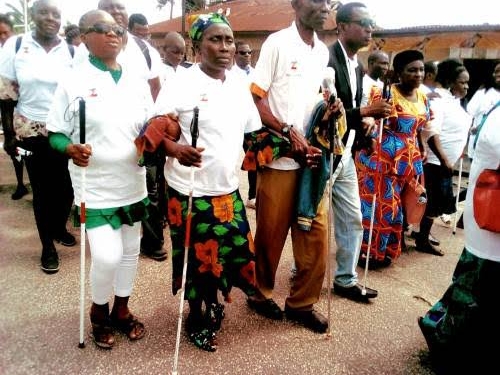As the AstraZeneca vaccines are being distributed across states in Nigeria, the Lagos State Chapter of Nigeria Association of the Blind (NAB) has called on Governor Babajide Olusola Sanwo-olu to respect Article 11 of the Convention on the Rights of Persons With Disabilities (CRPD) and give priority access to Persons With Disabilities (PWDs).
The association expressed concerned that disabled persons in the state form a critical bulk of the communities at greater risk as the virus continues to impact lives across borders.
According to Barrister Lukman Abolarinwa Salami, Chairman of the association, the CRPD, to which Nigeria is a signatory, imposes obligation on state parties to make disabled persons a priority in disaster and risk management efforts.
“In fact, Section 30 of the Lagos State Special People’s Law also guarantees every disable persons priority attention in matters of public emergency response,’ Salami noted.
No less than 500,000 Persons With Disabilities, including primary and secondary school students are resident in Lagos alone, explained gbenga Ogundare, Public Relations Officer of the association, “so there is palpable worries about reaching those who may face technological or geographic barriers to access the vaccine,’ he explained.
“Truth is that disabled persons are the most vulnerable when it comes to the pandemic. Those on wheelchairs and crutches lack immunity and mobility. the blind cannot maintain social distancing because they need sighted assistance for their every day activities, and many cannot understand what is going on around them as modes and means of communication are not accessible to them.
“This community, therefore, “deserves to be given a chance to survive the pandemic through priority access to the vaccine,’ Ogundare emphasized.
Article 11 of the CRPD reinforces and specifies States’ obligations under international humanitarian law to ensure the protection and safety of persons with disabilities in situations of risk, including armed conflict, humanitarian emergencies and natural disasters, consistent with the approach adopted by the CRPd.
It states: “States Parties shall take, in accordance with their obligations under international law, including international humanitarian law and international human rights law, all necessary measures to ensure the protection and safety of persons with disabilities in situations of risk, including situations of armed conflict, humanitarian emergencies and the occurrence of natural disasters.”

